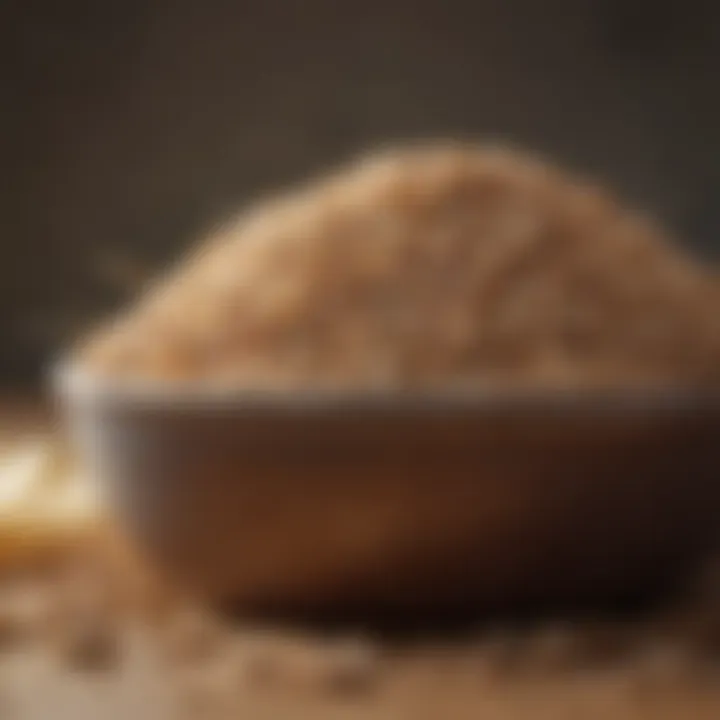Best Foods to Relieve Bloating Quickly and Naturally


Wellness
To begin addressing bloating, one must first understand the crucial link between what we eat and how our bodies react. A vital aspect to consider in combatting bloating is our physical health. It is essential to choose foods that support proper digestion and reduce gas formation. A focus on probiotic-rich foods like yogurt and kefir can aid in maintaining a healthy gut flora and reducing bloating. Incorporating fiber-rich foods such as fruits, vegetables, and whole grains can also promote regular bowel movements, reducing the chances of bloating.
Nutrition and Diet
Delving deeper into nutrition and diet, exploring ways to alleviate bloating fast becomes more nuanced. Certain foods are known culprits that can trigger bloating in individuals sensitive to them. Foods high in FODMAPs (fermentable oligosaccharides, disaccharides, monosaccharides, and polyols) like onions, garlic, and certain fruits can lead to bloating in susceptible individuals. By identifying and eliminating trigger foods from your diet, you can significantly reduce bloating and improve gastrointestinal comfort.
Diet Adjustments
Adopting specific dietary adjustments can play a key role in reducing bloating promptly. Consuming smaller, more frequent meals throughout the day rather than large meals can help prevent overeating and reduce bloating. Additionally, staying well-hydrated by drinking an adequate amount of water can aid in digestion and prevent water retention that may contribute to bloating. Herbs like ginger and peppermint have been traditionally used to alleviate digestive issues, including bloating, making them valuable additions to your dietary arsenal against bloating.
Tools for Living Better
Health Tips
Incorporating these dietary strategies and lifestyle changes can significantly impact your overall well-being and digestive health. Track your food intake and symptoms to identify patterns and trigger foods that cause bloating for you personally. Planning your meals mindfully and being aware of portion sizes can prevent bloating episodes. Engage in regular physical activity to aid digestion and reduce bloating, as exercise can help move gas through the digestive system and alleviate discomfort. By arming yourself with these practical tools for living better, you can navigate the challenge of bloating effectively and improve your quality of life.
Understanding Bloating
Bloating can be a discomforting issue that many individuals face regularly due to various underlying factors. In this article, we delve into the significant topic of understanding bloating to provide readers with essential insights into the causes and effects of this condition. By comprehending the root causes of bloating, individuals can adopt effective dietary strategies to alleviate bloating and enhance their overall well-being.
Causes of Bloating
Excessive Gas Production
Excessive gas production is a common cause of bloating, resulting from the fermentation of undigested food in the colon. This process leads to the accumulation of gas in the digestive tract, causing abdominal distention and discomfort. Understanding the role of excessive gas production is crucial in addressing bloating, as it necessitates adopting dietary changes that support proper digestion and reduce gas formation.


Digestive Disorders
Digestive disorders such as irritable bowel syndrome (IBS) or small intestinal bacterial overgrowth (SIBO) can significantly contribute to bloating. These conditions impact the digestive process, leading to irregular bowel movements, abdominal pain, and bloating. Recognizing the implications of digestive disorders is essential in managing bloating effectively through tailored dietary modifications and potentially medical interventions.
Food Intolerances
Food intolerances, such as lactose intolerance or gluten sensitivity, can trigger bloating in susceptible individuals. The inability to digest certain components in food can provoke digestive distress, including bloating, gas, and abdominal discomfort. Identifying and eliminating trigger foods from the diet is pivotal in alleviating bloating associated with food intolerances and restoring digestive comfort.
Impact on Daily Life
Discomfort and Distention
The discomfort and distention caused by bloating can significantly impact an individual's quality of life. Persistent bloating can lead to physical discomfort, decreased appetite, and self-consciousness in social settings. Addressing bloating-related discomfort and distention through dietary interventions can enhance overall well-being and restore confidence in daily activities.
Reduced Energy Levels
Bloating can also contribute to reduced energy levels and feelings of fatigue due to the body's focus on digesting food inefficiently. Persistent bloating may lead to decreased motivation, difficulty concentrating, and low energy levels throughout the day. By tackling bloating through dietary adjustments and lifestyle changes, individuals can combat fatigue and restore optimal energy levels for improved daily productivity and vitality.
Dietary Tips for Combatting Bloating
In this article, the focus is on understanding and implementing effective dietary strategies to alleviate bloating quickly. By making informed choices about what you eat, the aim is to address bloating proactively and enhance digestive comfort. Through the exploration of dietary tips, readers can gain insights into combating bloating efficiently and promoting overall well-being.
Hydration
Importance of Water Intake
Hydration plays a vital role in combating bloating. Ensuring adequate water intake is crucial for maintaining healthy digestion and reducing bloating. Water helps in flushing out toxins, aiding in smooth bowel movements, and preventing constipation. By staying well-hydrated, individuals can support their digestive system and minimize the risk of bloating. Acknowledging the significance of water intake and incorporating it into daily routines can have a positive impact on overall health.
Herbal Teas


Including herbal teas in one's diet can be beneficial for battling bloating. Herbal teas such as peppermint or ginger tea are known for their digestive properties. Peppermint tea, for example, can help relax intestinal muscles, reducing bloating and discomfort. Ginger tea is valued for its anti-inflammatory properties, which can aid in soothing the digestive system. Integrating herbal teas into daily consumption habits can contribute to alleviating bloating and promoting digestive well-being.
Fiber-Rich Foods
Whole Grains
Whole grains are an essential component of a bloating-fighting diet. Rich in fiber, whole grains facilitate healthy digestion by promoting bowel regularity and preventing constipation. The fiber content in whole grains also aids in promoting a feeling of fullness, which can prevent overeating and reduce the likelihood of bloating. Including whole grains such as oats, quinoa, and brown rice in meals can enhance digestive health and support bloating reduction.
Fresh Fruits and Vegetables
The incorporation of fresh fruits and vegetables into daily meals can be instrumental in combatting bloating. These foods are packed with essential nutrients, antioxidants, and fiber that promote optimal digestion. Fruits like berries, apples, and bananas, along with vegetables like spinach, broccoli, and bell peppers, can aid in reducing bloating and improving overall gut health. Their high water content also helps in staying hydrated, supporting digestive processes, and mitigating bloating symptoms.
Probiotics
Yogurt
Yogurt, a probiotic-rich food, offers numerous benefits for combating bloating. Probiotics are 'good' bacteria that support gut health and aid in digestion. Yogurt contains live cultures that can help restore the balance of healthy bacteria in the gut, reducing bloating and improving overall digestive function. Consuming yogurt regularly can contribute to alleviating bloating symptoms and promoting a healthy gut environment.
Kefir
Kefir is another probiotic-rich option that can assist in reducing bloating. This fermented dairy product contains a diverse range of beneficial bacteria strains that support gut health. Kefir consumption can help improve digestion, reduce gas production, and alleviate bloating discomfort. Integrating kefir into one's diet can enhance the microbial diversity in the gut, fostering better digestive health and contributing to a reduction in bloating.
In the quest to beat bloating effectively, knowing what to avoid is crucial. High-sodium foods can exacerbate bloating and discomfort, making it essential to steer clear of these culprits. Processed foods are a major offender in this category. Their high sodium content not only leads to water retention but also disrupts the delicate balance in the body, contributing to bloating. Despite their convenience, processed foods lack the essential nutrients needed for good digestive health, making them a detrimental choice when battling bloating. On the other hand, canned soups, another high-sodium culprit, are equally problematic. These soups contain excessive salt levels, which can trigger bloating and water retention. While they may seem like a quick fix for meal times, their high sodium content outweighs any convenience they offer when combating bloating.
When discussing carbonated beverages, sodas are a significant player in the bloating game. Sodas are packed with carbon dioxide, which can accumulate in the digestive system, leading to uncomfortable bloating. The high sugar content in sodas can also disrupt gut health, further aggravating bloating issues. Despite their refreshing taste, sodas do little to support digestive comfort and should be avoided when aiming to alleviate bloating. On the other hand, sparkling water, a seemingly harmless choice, can also contribute to bloating. The carbonation in sparkling water can introduce excess air into the digestive tract, causing bloating and discomfort. While it may be a healthier alternative to sodas, sparkling water may not be the best option for individuals struggling with bloating issues. Being mindful of the impact of these carbonated beverages on bloating is crucial in creating a diet that promotes digestive comfort and reduces bloating episodes.
Mindful Eating Practices


In the pursuit of alleviating bloating swiftly, the focus shifts to the vital aspect of mindful eating practices. Embracing mindfulness while consuming food plays a crucial role in combating bloating efficiently. By paying close attention to how you eat, you can significantly reduce the chances of bloating and enhance overall digestive comfort. Mindful eating involves being fully present during meals, savoring each bite, and listening to your body's hunger and satiety cues. This practice ensures that you eat at a pace that promotes digestion and reduces bloating. Additionally, mindful eating encourages better food choices and portion control, further aiding in bloating relief. Emphasizing this practice not only addresses bloating but also fosters a healthier relationship with food, promoting long-term well-being.
Chewing Food Thoroughly
Enhancing Digestion
Delving deeper into the specifics of enhancing digestion through thorough chewing, it becomes evident why this practice holds great significance in the context of combating bloating. Thoroughly chewing food assists in breaking down food particles into smaller, more digestible forms. This process initiates the release of digestive enzymes in the mouth, kickstarting the digestion process and easing the burden on the gastrointestinal system. By enhancing digestion through proper chewing, the body can extract nutrients more efficiently, leading to reduced bloating and improved overall digestive health. This effective and popular choice in bloating alleviation underscores the crucial role that chewing plays in optimizing the digestive process and mitigating digestive discomfort.
Reducing Swallowing Air
Transitioning to the importance of reducing air intake while eating, this aspect proves to be instrumental in the overarching goal of combatting bloating swiftly. Swallowing excess air while consuming food can contribute to bloating and discomfort. Mindfully reducing the intake of air during meals minimizes the chances of excess gas buildup in the digestive tract, consequently reducing bloating. This mindful practice not only aids in bloating relief but also promotes better digestion and gastrointestinal function. By acknowledging the impact of swallowing air on bloating and actively implementing strategies to minimize it, individuals can experience significant improvements in digestive comfort and overall well-being.
Eating Slowly
Exploring the significance of eating slowly in the context of bloating alleviation, it becomes apparent why this practice is recommended for optimizing digestive health and reducing discomfort. Eating slowly allows for better digestion as it gives the body ample time to process and absorb nutrients effectively. By slowing down the eating pace, individuals can enhance satiety signals, signaling to the brain when they are full and preventing overeating. Improving satiety signals through slow eating not only aids in bloating reduction but also supports weight management and overall digestive wellness. This beneficial approach to eating ensures that individuals enjoy their meals mindfully, leading to better digestion, reduced bloating, and improved overall health.
Herbal Remedies for Bloating
In the quest to alleviate bloating swiftly, exploring herbal remedies becomes pivotal. Herbal remedies offer a natural and effective approach to combat bloating, addressing the root causes with gentle yet potent solutions. By incorporating herbal remedies into your daily routine, you can benefit from their soothing and anti-inflammatory properties, promoting digestive comfort and overall well-being. Herbal remedies serve as a complement to dietary adjustments, enhancing the holistic approach to reducing bloating.
Peppermint Tea
Relaxing Intestinal Muscles
Delving into the specifics of peppermint tea, its notable feature lies in its ability to relax intestinal muscles. This characteristic plays a crucial role in easing gastrointestinal distress and reducing bloating. The menthol present in peppermint tea acts as a natural muscle relaxant, soothing spasms and discomfort within the digestive tract. By promoting muscle relaxation, peppermint tea aids in alleviating gas buildup and bloating, offering relief to individuals experiencing digestive issues.
Peppermint tea's unique feature of relaxing intestinal muscles contributes significantly to combating bloating efficiently. Its gentle yet effective nature makes it a popular choice for addressing digestive discomfort. The ability of peppermint tea to target muscle tension alleviates bloating symptoms, providing comfort and promoting digestive wellness. While peppermint tea offers numerous advantages in reducing bloating, individuals should be mindful of potential allergies or sensitivities to mint.
Ginger Infusions
Anti-Inflammatory Properties
Turning to ginger infusions, their key characteristic lies in their potent anti-inflammatory properties. Ginger contains bioactive compounds with strong anti-inflammatory effects, making it a valuable asset in alleviating bloating and associated discomfort. The anti-inflammatory nature of ginger helps reduce swelling and inflammation in the digestive system, easing bloating and promoting optimal intestinal function.
The unique feature of ginger infusions rests in their ability to combat inflammation within the digestive tract, contributing significantly to reducing bloating. The popularity of ginger as a natural remedy for bloating stems from its well-documented anti-inflammatory properties. By incorporating ginger infusions into your routine, you can harness its anti-inflammatory benefits to support digestive health and alleviate bloating. While ginger infusions offer substantial advantages in reducing bloating, individuals should be cautious of consuming excessive amounts due to potential gastrointestinal side effects.



